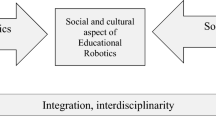Abstract
Educational robotics is nowadays used in various learning environments, adopting different learning goals depending on the application context (e.g. collaborative vs. competitive activities). The digital transformation and Industry 4.0 with the use of an increasing number of sensors, and the use of smart devices, have been demanding environments where robots communicate and collaborate. This paper discusses the use of multi-robotic educational environments, trying to identify some scenarios where more than one robot is used in collaborative environments and what impact it has in the learning activities. In a teacher training course ranging from primary to secondary and to vocational teachers, a low-cost robot with Wi-Fi capabilities was used to test simple challenges for coordination using an MQTT protocol. A simple questionnaire was developed to record teachers’ opinions about this experience. In the end, we argue that activities of this type, using a mixture of IoT and robotics can foster students imagination and opens up the possibility of creating tasks in important areas of knowledge linked to IoT and robotics.
Access this chapter
Tax calculation will be finalised at checkout
Purchases are for personal use only
Similar content being viewed by others
References
Eclipse Mosquitto an all-round MQTT client that provides a structured topic overview. https://mosquitto.org/. Accessed 22 Feb 2012
MQTT - Explorer an open source MQTT broker. http://mqtt-explorer.com/. Accessed 22 Feb 2012
MQTT the standard for IoT messaging. https://mqtt.org/. Accessed 22 Feb 2012
Robocup. https://www.robocup.org/. Accessed 22 Feb 2012
Afrin, M., Jin, J., Rahman, A., Rahman, A., Wan, J., Hossain, E.: Resource allocation and service provisioning in multi-agent cloud robotics: a comprehensive survey. IEEE Commun. Surv. Tutorials 23(2), 842–870 (2021). https://doi.org/10.1109/COMST.2021.3061435
Antonioni, E., Suriani, V., Riccio, F., Nardi, D.: Game strategies for physical robot soccer players: a survey. IEEE Trans. Games 13(4), 342–357 (2021). https://doi.org/10.1109/TG.2021.3075065
Arduino: Arduino doc pages. https://docs.arduino.cc/learn/. Accessed 22 Feb 2012
Cascalho, J., Pedro, F., Mendes, A., Funk, M., Ramos, A., Novo, P.: Azoresbot v2: a new robot for learning robotics and science at schools. In: 2021 IEEE International Conference on Autonomous Robot Systems and Competitions (ICARSC), pp. 62–67 (2021). https://doi.org/10.1109/ICARSC52212.2021.9429815
Efraín, G.B.D., del Carmen, V.C.A., Fernando, E.C.L., Cesar, L.M.D.: Implementation of an IoT architecture based on MQTT for a multi-robot system. In: 2018 IEEE Third Ecuador Technical Chapters Meeting (ETCM), pp. 1–6 (2018). https://doi.org/10.1109/ETCM.2018.8580321
Escobar, L., Moyano, C., Aguirre, G., Guerra, G., Allauca, L., Loza, D.: Multi-robot platform with features of cyber-physical systems for education applications. In: 2020 IEEE ANDESCON, pp. 1–6 (2020). https://doi.org/10.1109/ANDESCON50619.2020.9272030
Klötzer, C., Weißenborn, J., Pflaum, A.: The evolution of cyber-physical systems as a driving force behind digital transformation. In: 2017 IEEE 19th Conference on Business Informatics (CBI), vol. 02, pp. 5–14 (2017). https://doi.org/10.1109/CBI.2017.8
Mukhandi, M., Portugal, D., Pereira, S., Couceiro, M.S.: A novel solution for securing robot communications based on the MQTT protocol and ROS. In: 2019 IEEE/SICE International Symposium on System Integration (SII), pp. 608–613 (2019). https://doi.org/10.1109/SII.2019.8700390
Peters, A., Vargas, F., Garrido, C., Andrade, C., Villenas, F.: Pl-toon: a low-cost experimental platform for teaching and research on decentralized cooperative control. Sensors 21, 2072 (2021). https://doi.org/10.3390/s21062072
Ribeiro, A., Lopes, G.: Learning robotics: a review. Current Robot. Rep. 1, 1–11 (2020)
Romeo, L., Petitti, A., Marani, R., Milella, A.: Internet of robotic things in smart domains: applications and challenges. Sensors 20(12) (2020). https://doi.org/10.3390/s20123355
Salkin, C., Oner, M., Ustundag, A., Cevikcan, E.: A Conceptual Framework for Industry 4.0, pp. 3–23. Springer, Cham (2018). https://doi.org/10.1007/978-3-319-57870-5_1
Simoens, P., Dragone, M., Saffiotti, A.: The internet of robotic things: a review of concept, added value and applications. Int. J. Adv. Robot. Syst. 15(1), 1729881418759424 (2018). https://doi.org/10.1177/1729881418759424
Siriweera, A., Naruse, K.: Survey on cloud robotics architecture and model-driven reference architecture for decentralized multicloud heterogeneous-robotics platform. IEEE Access 9, 40521–40539 (2021). https://doi.org/10.1109/ACCESS.2021.3064192
Verner, I.M., Cuperman, D., Reitman, M.: Exploring robot connectivity and collaborative sensing in a high-school enrichment program. Robotics 10(1) (2021). https://doi.org/10.3390/robotics10010013, https://www.mdpi.com/2218-6581/10/1/13
Sahni, Y., Cao, J., Jiang, S.: Middleware for multi-robot systems. In: Ammari, H.M. (ed.) Mission-Oriented Sensor Networks and Systems: Art and Science. SSDC, vol. 164, pp. 633–673. Springer, Cham (2019). https://doi.org/10.1007/978-3-319-92384-0_18
Acknowledgements
This work has been supported by DRCT - Direção Regional de Ciência e Tecnologia, Governo dos Açores, under the project M3.4.B/ PRO.ROBÓTICA/001/2021.
Author information
Authors and Affiliations
Corresponding author
Editor information
Editors and Affiliations
Rights and permissions
Copyright information
© 2022 The Author(s), under exclusive license to Springer Nature Switzerland AG
About this paper
Cite this paper
Cascalho, J., Mendes, A., Pedro, F., Ramos, A., Medeiros, P., Funk, M. (2022). Communication in Educational Robots: From Coordination to IoT Systems. In: Pereira, A.I., Košir, A., Fernandes, F.P., Pacheco, M.F., Teixeira, J.P., Lopes, R.P. (eds) Optimization, Learning Algorithms and Applications. OL2A 2022. Communications in Computer and Information Science, vol 1754. Springer, Cham. https://doi.org/10.1007/978-3-031-23236-7_45
Download citation
DOI: https://doi.org/10.1007/978-3-031-23236-7_45
Published:
Publisher Name: Springer, Cham
Print ISBN: 978-3-031-23235-0
Online ISBN: 978-3-031-23236-7
eBook Packages: Computer ScienceComputer Science (R0)





